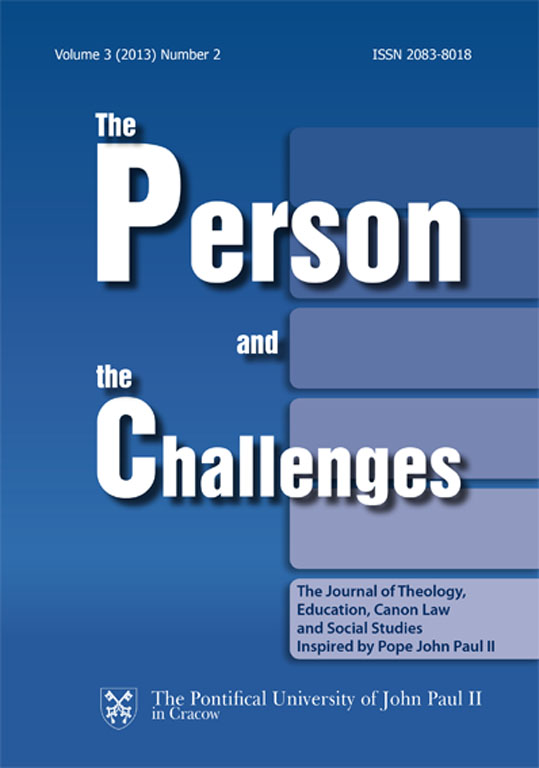Die Rechtfertigung der Gier und die Finanzkrise
DOI:
https://doi.org/10.15633/pch.501Słowa kluczowe:
A justification of greed, the ecology of person, economic crisis, catholic social teachingAbstrakt
The aim of this article is at first to answer the question of greed (the justification of this “virtue” in the modern economic system), which is meant, in the light of Christian social ethics to be the primary cause of the present economic crisis. In the three steps of catholic social teaching (see, judge, act) we want to interpret the signs of our time (present age problems) in the light of the Gospel (and the teaching and tradition of the Church). The relevant question we have to pose in our statement is: Why does catholic social teaching, in opposite to the modern view of economic and political science, object to a justification of greed? The third (practical) step of our explanations we can paraphrase with the question: what shall we do? The focusing on institutional reforms, the belief in arrangements which exclusively accentuate sociological key aspects and believe in changes of structures (in education, politics, economics and welfare) led not only to market crisis, but also to a crisis of culture. If the human being in his/her deepest dimension (the ecology of person) is suffering, then the Church cannot remain silent, because its mission and way is the person. Not until we – like king Solomon – turn to God and ask for help and the ability to judge between good and evil, just and unjust, shall we find a safe basis to lead us out of despair and disorientation into a more humane civilization of humanity and solidarity.
Bibliografia
Augustinus, De Civitate Dei, (Hg.) Horn Ch., Berlin 1997; www.thelatinlibrary.com/august.html.
Benedikt XVI, Caritas in veritate, Vatican 2009.
Bökenförde E.W., Staat, Gesellschaft, Freiheit, Frankfurt 1976.
Diez A., Der homo oeconomicus in der Perspektive theologischer Wirtschaftsethik, Heidelberg 2004.
Fischer N., Sein und Sinn der menschlichen Freiheit in der Philosophie Kants, in: Böttigheimer Ch., Fischer N., Gerwing M. (Hg.), Sein und Sollen des Menschen, Münster 2009.
Gorissen B., Glaube statt Inflation, „Die Tagespost“ Nr. 142 (27 XI 2012), S. 9.
Hayek F.A. v., Individualismus und wirtschaftliche Ordnung, Salzburg 1976.
www.naszdziennik.pl/mysl/16231,podatek-od-prawdy.html (03.12.2012).
www.unilu.ch/files/die-zeichen-der-zeit-erkennen.pdf (30.08.2012).
www.vatican.va/archive/hist_councils/ii_vatican_council/documents/vat-ii_const_19651207_gaudium-et-spes_ge.html.
www.fahayek.net/publish/portrait/HayekPortraet.pdf (26.11.2012).
Höffe O. (Hg.), Aristoteles. Politik, Berlin 2011.
Höffner J., Christliche Gesellschaftslehre, Kevelaer 2000.
Hörisch J., Kopf oder Zahl. Die Poesie des Geldes, Frankfurt 1996.
Johannes Paul II, Centesimus annus, www.vatican.va/holy_father/john_paul_ii/encyclicals/documents/hf_jp-ii_enc_01051991_centesimus-annus_ge.html (05.12.2012).
Kant I., Metaphysik der Sitten, 2. Teil, A 139, in: Weischedel W. (Hg.), Immanuel Kant. Werke in sechs Bänden, Wissenschaftliche Buchgesellschaft, Darmstadt (1956–1964), Bd. 4.
Kasper W., Barmherzigkeit. Grundbegriff des Evangeliums – Schlüssel christlichen Lebens, Herder 2012.
Kues H., Wegweiser in der Krise? Die Enzyklika caritas in veritate gibt der Soziallehre neuen Schwung, www.kas.de/wf/doc/kas_18249-544-1-30.pdf?100105164141 (23.11.2012).
Marx R., Das Kapital, München 2008.
Nothelle-Wildfeuer U., Markt und Moral? Impulse der katholischen Soziallehre und evangelischen Sozialethik zur Fortentwicklung der Sozialen Marktwirtschaft, www.ordosocialis.de/pdf/Nothelle-Wildfeuer/P-K-W%20-%20Ordo%20socialis.pdf (23.11.2012).
Oermann N.O., Anständig Geld verdienen?, München 2007.
Pax Christi-Kommission Weltwirtschaft (Hg.), Der Gott Kapital, Berlin 2006.
Pellegrin P., Hausverwaltung und Sklaverei (I 3–12), in: O. Höffe (Hg.), Aristoteles. Politik, Berlin 2011, S. 37–56.
Rede Papst Benedikts XVI. im Deutschen Bundestag am 22. September 2011, www.bundestag.de/kulturundgeschichte/geschichte/gastredner/benedict/rede.html (23.11.2012).
Rehder S., Das Naturrecht in der Denker-Werkstatt, „Die Tagespost“ (06.11.2012).
Röpke W., Marktwirtschaft ist nicht genug. Gesammelte Aufsätze, in: Hennecke, Hans Jörg (Hg.) Waltrop 2009.
Roos L., Die Katholische Soziallehre und die Reform des Sozialstaates, www.bku.de/html/img/pool/disk29kathsoz.pdf (23.11.2012).
Roos L., Rheinischer Merkur vom 9 VII 2009.
Sen A., Developement as freedom, Oxford 1999.
Sen A., Ökonomie für den Menschen. Wege zu Gerechtigkeit und Solidarität in der Marktwirtschaft, Hanser Verlag 2000.
Schönfelder P., Pax-Christi-Kommission Weltwirtschaft (Hg.), Der Gott Kapital. Einführung, Berlin 2006.
Smith A., Der Wohlstand der Nationen, München 2001.
Weber M., Wirtschaft und Wissenschaft. Grundriss der verstehenden Soziologie, Tübingen 1972.
Waleszczuk Z., Między egoizmem a dobrem wspólnym, Kraków 2008.
Waleszczuk Z., Kłamstwo „homo oeconomicus” a kryzys kultury, „Życie Konsekrowane” 3 (2010), S. 52–61.
Waleszczuk Z., Globalizacja solidarnosci, Wroclaw 2007.
Waleszczuk Z., Prawdziwy rozwój ludzki w epoce globalizacji. Komentarz do encykliki społecznej Benedykta XVI Caritas in veritate, „Homo Dei” 4 (2009), S. 107–112.
Pobrania
Opublikowane
Numer
Dział
Licencja
Prawa autorskie (c) 2013 Zbigniew Waleszczuk

Utwór dostępny jest na licencji Creative Commons Uznanie autorstwa 4.0 Międzynarodowe.
Autorzy publikujący w czasopiśmie udzielają jego wydawcy zgody o następującej treści:
- Autor zachowuje autorskie prawa majątkowe do utworu, a jednocześnie udziela wydawcy czasopisma zgody na jego pierwszą publikację w wersji drukowanej i wersji online na licencji Creative Commons Uznanie autorstwa 4.0 Międzynarodowe oraz zgody na wykonywanie opracowań, w tym przekładów.
- Autor ma możliwość udzielania zgody niewyłącznej na opublikowanie utworu w wersji, która ukazała się w czasopiśmie (np. zamieszczenia go w repozytorium instytucjonalnym lub opublikowania w książce), wraz z informacją o jego pierwszej publikacji w czasopiśmie.
- Autor może umieścić swój utwór online (np. w repozytorium instytucjonalnym lub na swojej stronie internetowej) jeszcze przed zgłoszeniem utworu do czasopisma.

